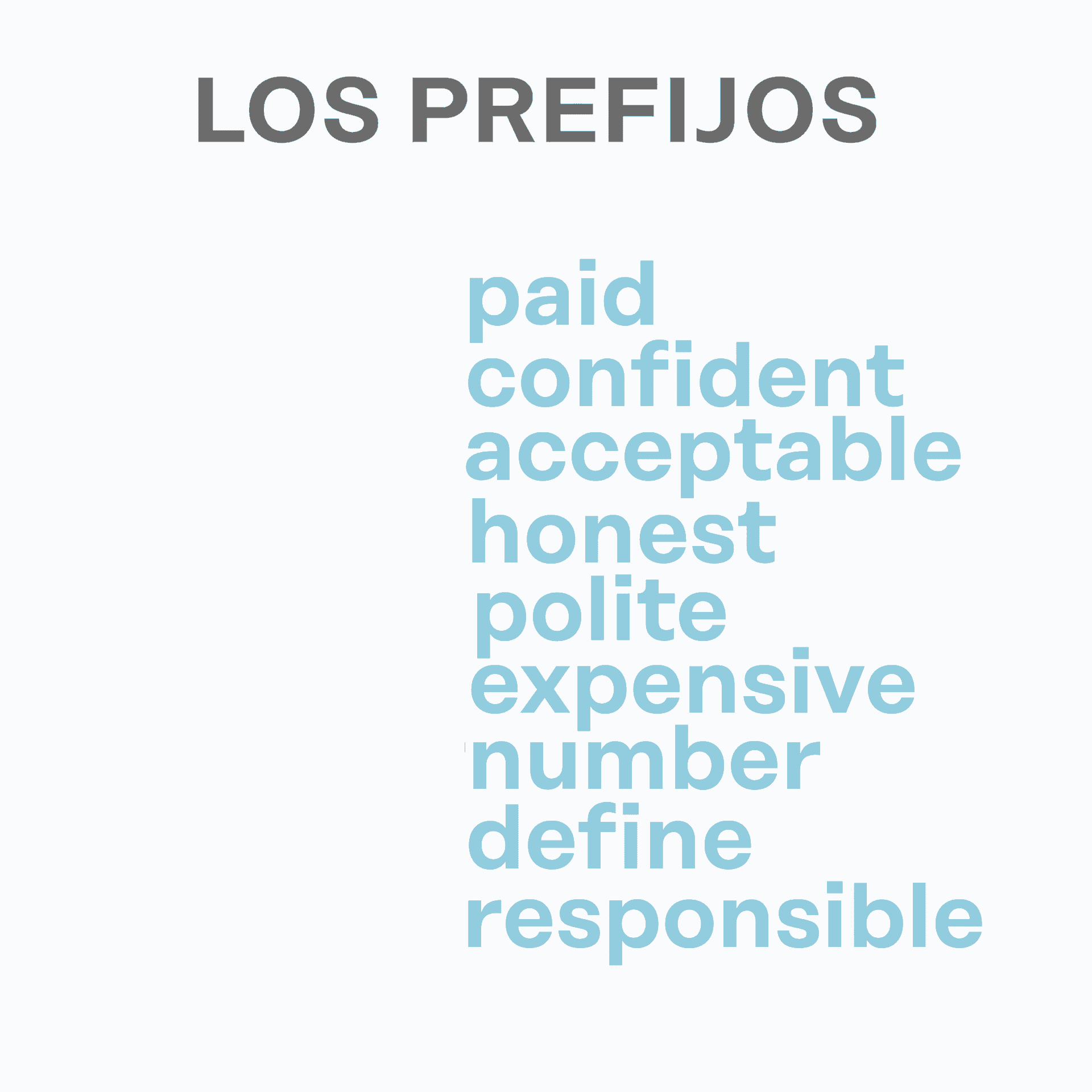
Los prefijos en inglés nos dan la posibilidad de crear nuevas palabras con las palabras que ya conocemos, por tanto aprenderlos es una manera increíble de aumentar tu vocabulario de forma rápida y fácil.
Y no solo eso, cuando conoces los prefijos en inglés, puedes averiguar el significado de nuevas palabras, sin necesidad de buscarlas en el diccionario. Yippee! ¿A que molan los prefijos?

Por ejemplo, seguro que conoces el verbo ‘understand’, ¿verdad? Y en esta clase, aprendemos que el prefijo MIS significa incorrecto o equivocado. Así que no hay que ser un lince para deducir que el verbo MISUNDERSTAND significa malinterpretar o malentender. ¡Ves! Ya te avisé que el mundo de los prefijos es un tema apasionante.
Are you ready? Let’s go to class!
¡Mini test al final del post!
Los prefijos más comunes en inglés
RE – (de nuevo/ otra vez)
Empezamos con el prefijo más fácil, que es igual que en español y significa ‘de nuevo’ u ‘otra vez’. ¡Puedes usarlo con muchísimas palabras! Estas son las más comunes:
- reread – I’d like to reread my favourite book this summer. (releer)
- redo – I have to redo my nails before my date tonight. (rehacer)
- rewrite – My teacher made me rewrite my assignment. (escribir de nuevo)
- redesign – I’d like to redesign my bathroom. (rediseñar)
- reproduce – Keep your pet rabbits separate or they’ll reproduce. (reproducir)
- reorder – My package got lost in the mail so I’ll have to reorder it. (pedir de nuevo)
- reheat – You shouldn’t reheat rice more than twice. (recalentar)
- reintroduce – Native wolves are being reintroduced into the pyrenees. (reintroducir)
- redefine – We need to redefine our company values. (redefinir)
- reinvent – Madonna reinvents herself every five years. (reinventar)
- resend – I didn’t get your email. Can you resend it, please? (reenviar)
- resit – I failed my First Certificate exam and I have to resit it this summer. (rehacer)
- remarry – After the death of her husband she never remarried. (casarse de nuevo)
OVER- / UNDER – (demasiado / no lo suficientemente)
Estos prefijos denotan ‘demasiado’ y ‘una falta’ de algo. Por ejemplo…
- overcook / undercook (cocinado de más / menos)
- overestimate / underestimate (sobreestimar / subestimar)
- overrated / underrated (sobrevalorado / infravalorado)
- overpaid / underpaid (pagado de más / mal pagado)
- overworked / underworked (con sobrecarga de trabajo / con poca carga de trabajo)
- overconfident /underconfident (arrogante / inseguro)
- overage / underage (mayor / menor de edad)
Ejemplos…
- The new Terminator film is totally overrated. Don’t bother going to see it.
- British nurses are overworked and underpaid.
- If you are underage you will not be allowed inside the club.
- Excuse me, this pasta is undercooked.
- Never underestimate your rivals.
MIS – (incorrecto)
Como mencionamos al principio, este prefijo significa que algo está mal hecho o es incorrecto. Estos son los prefijos más útiles con ‘mis’…
- misunderstand – Sorry, I think you misunderstood me. (malentender)
- mishear – You misheard me! I said I need a SHEET! (escuchar mal)
- mispronounce – People always mispronounce my name. (pronunciar mal)
- mislead – That advertisement is very misleading! (engañar, confundir)
- misspeak – Forgive me! I misspoke! (decir algo inapropiado)
- misspell – Students always misspell ‘ACCOMMODATION’ (deletrear mal)
- mistreat – My dog was mistreated by her previous owner. (maltratar)
- misjudge – I misjudged the hight of the step and fell. (juzgar equivocadamente)
- misplace – Was your bike stolen or did you simply misplace it? (perder)
- misbehave – If you misbehave you’ll be sent to the headmaster’s office. (comportarse mal)
- miscalculate – I think you’ve miscalculated my bill. (calcular mal)
Los prefijos de negación IM- IN- IR- IL- UN- DIS-
Mira mis reseñas del último restaurante en el que estuvimos:
- The waitress was rather impolite. (maleducado)
- The English translation of the menu was illegible. (ilegible)
- The main course was surprisingly tasty and inexpensive. (barato)
- The desserts were irresistible. (irresistible)
- There was a disagreement in the kitchen. (discusión, desacuerdo)
- We are uncertain if we’ll return. (incierto)
Aquí te dejo más palabras que van con estos prefijios…
IM-
- impolite
- impossible
- improbable
- immortal
- immoral
- immature
- imbalance
- impatient
- impolite
- imperfect
- impractical
IN-
- inexpensive
- inexplicable
- infamous
- inexcusable
- insane
- invalid
- ineffective
- insecure
- incomplete
- inaccurate
- indecisive
IR-
- irrelevant
- irresponsible
- irrational
- irreversible
- irregular
- irreplaceable
- irresistible
DIS-
- disappear
- disconnect
- disable
- disintegrate
- disagree
- dislike
- disloyal
- disobey
- disapprove
- dishonest
- disloyal
- disinfect
- disadvantage
UN-
- unimportant
- unhappy
- unacceptable
- undo
- unaware
- uncertain
- unemployed
- unfit
- unexpected
- untie
- unconscious
- unreasonable
- uncomfortable
IL-
- illegal
- illogical
- illiterate
- illegible
- illegitimate
¡Ahora practica leyendo estos ejemplos con prefijos en voz alta!
- It’s not illegal to be indecisive!
- What you have done is inexcusable!
- It is unwise to disobey the boss because she’s very impatient.
- Stop being so immature and irresponsible!
- If you disagree with me, I’ll be very unhappy.
- I was unaware that you are unemployed.
- One disadvantage of being unfit is that you could have an unexpected heart attack.
OUT – (más y/o mejor)
Este prefijo es muy util si quieres indicar que algo es más y mejor que otra cosa. Como puedes ver en los ejemplos indica superación o mejoría:
- outnumber – In my English class, girls outnumber boys by 10:1. (sobrepasar, superar)
- outsmart – The chess champion was outsmarted by a 14-year-old girl. (ser más listo)
- outvote – Hilary was outvoted by Trump in the 2016 elections. (conseguir más votos)
- outmanoeuvre – The fighter pilot was outmanoeuvred by his enemy. (ser más hábil)
- outrun – Usain Bolt easily outran his competitors. (aventajar, dejar atrás)
- outshine – If you wear that dress you might outshine the bride! (eclipsar)
EN – (causar a)
Este prefijo se usa para transformar algunos sustantivos a verbos y significa “poner en estado de” o “causar a”. Mira estos ejemplos:
- enlarge – That photo is too small! Can you enlarge it please? (agrandar)
- enrage – It enrages me when I see people dropping litter. (enfurecer)
- enlighten – No I don’t know the answer. Please, enlighten me. (iluminar)
- endanger – Most of the animals on the island are endangered species. (poner en peligro)
- enclose – I have enclosed my CV with this letter. (incluir, adjuntar)
- ensure – Please ensure your seatbelt is fastened before are off. (asegurar)
- enrich – Travelling abroad enriches your life in so many ways. (enriquecer)
¿Puedes sacar un 10 en el test de prefijos?
All right! Pues ahora que ya dominas los ‘prefijos’, estate pendiente porque la semana que viene tendremos una clase de ‘sufijos’. Whoop whoop this is getting exciting!
Mientras tanto, si quieres seguir enamorando a tus profes de inglés con redacciones de otro planeta, no te pierdas esta clase de conectores en inglés.
Much love from Amigos Ingleses HQ! 🤟




Here with you lovely web I’ve learnt a lot of things.
That makes my day Lucía! Happy learning!🙂
La 4 era para pillar, je je je , no caí en que era un “adverb”.
Masterclass as always!
Thanks a lot.
Not good, I need to study more 🙁
fantastic! I learnt something new before going to sleep. Thank you. Best wishes from Perú.
Isabel, I have got 9 out 10; thank you so much for your dedication, I am learning a lot with your lesson.
Thank you so much for helping me to improve English. You are the best teachers!!!😘
Thank you! Amigos Ingleses!
I will have to reread them everyday.
Thaks Very much for this Blog.
I just found this website by your videos, is AMAZING, there is no other people doing this dedicated work that you do guy’s, Thank u so much ❤❤❤🌟
Thank you ever so much Carla! We really appreciate your lovely comment!😍
great class. very import. thanks
I really love the master classes of english friends, I learn a lot indeed. Greetings from Buenos Aires, Argentina y un abrazo muy grande desde la cuarentena para ambos!
Thank you for teaching us so many things!! I’m improving my listening English.
I learned a lot with this class! Thank you very much!! Cheers!! I’m enriched now!!!
9/10, I think I need to practice harder.
I take my hat off for you. Thanks a lot
Hello Amigos Ingleses!
Great class, thank you.
I have a question: is there some sort of rule for whether you put the prefix “un-” or “in-” before a word to create its contrary? I realized that I often choose the wrong one…
I guess, I just have to learn them!! Haaha
Hello amigos ingleses
Thank you for your excellent help, with this page I had an invaluable experience. Bless you.
Congratulations Amigos Ingleses, your videos are very helpful and easygoing.
I had wrong question number 4 on the test, but checking above I read IMMATURE word as I answered, could you give me the correct answer please?
Thanks a lot and continue doing so good!
¡Hola Natalia!
En la frase número 4 necesitas un adverbio. 👀 ¿Cómo dirías que alguien se comporta de manera inmadura?
Hello amigos ingleses!!! I lo ve yogur classes.Thanks for share these Tips.
Thank you so much Miriam! 😍
Thanks a lot for the fantastic job you’ve made preparing this lessons. You’re the best! I’ve got 9 out 10. I keep building my vocabulary thanks to you!
Yippee!!! Well done Cary! 🥳 🤟
This is a perfect activity to review some prefixes and improve my vocabualry. Thanks Isabel and Phillip. You´re great.
Hello! I’ve got 9 out 10. This is an universe of different words, it’s amazing!
Thank you for your dedication, I’m learning a lot with this lesson.
Hello amigos ingleses,
Thanks for preparing such good learning material. I know it’s a matter of practice… I’m still working on some of the things you shared in the previous lesson.
Greetings
EXCELLENT CLASS THANK YOU
IT IS WONDERFUL TO BE ABLE TO PARTICIPATE IN AMIGOS INGLESES
8/10
Thanks to you I’m revising things I though I had already acquired!
Hello, I have problems with this… but with your explanation I got 9 out 10. This help me a lot, You rock
Hi guys this exercise really help me! Greetings from colombia
Hey Isabel & Phillip
I`ve got 9, great class. Thanks a lot
Before the lesson I got 3 of 10 and after the lesson I got 7 of 10. It’s not perfect but it’s a huge difference, thank you very much for your help and efforts, you are awesome
Great class and the exercise has been very useful.
Hey Amigos Ingleses!
Great job! Congrats!🙌👌😎
Thank you very much for everything!!❤•❤
Hello, I got 7 out 10. This class helps me a lot!! Thanks for your fantastic work.
Hello amigos ingleses
Thank you for sharing this classes.
This class help me a lot.
I love your Job, Amigos ingleses is the best english channel. Thank you so much guys. Greetings from Colombia
6/10